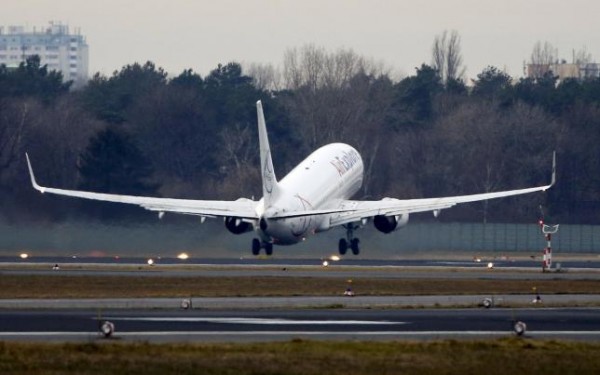
The first thing that Leith Khdeir Abbas, a 27-year-old Iraqi asylum seeker who arrived in Germany four months ago, plans to do after he makes the return journey on Wednesday is to kneel down and kiss the soil that he calls home.
“I fled to Germany to build my future. But I realized I can’t build it on fake promises,” he said at Berlin’s Tegel airport where he and some 50 similarly disenchanted young Iraqi men were about to board an Iraqi Airways plane to Erbil in northern Iraq.
A growing number of Iraqi refugees in Germany are choosing to return to their war-torn country, frustrated with a slow asylum process in a country overwhelmed by the influx of 1.1 million asylum seekers last year, most still living in shelters.
The trip to Germany from his home city of Baghdad cost him $4,000, including a fee for smugglers who put him on a boat from Turkey to Greece, where he and hundreds of asylum seekers embarked on a weeks-long trek to Germany via the Balkans and Austria.
German Interior Ministry data show that the number of Iraqis choosing to return home began rising in September, when 61 left, up from about 10 in each of the first seven months of the year. In December the number of Iraqi returnees topped 200.
That is still a fraction of the almost 30,000 who applied for asylum in Germany last year, accounting for the fifth largest group after Syrians, Albanians, Kosovars and Afghans.
But the trend highlights the harsh reality for asylum seekers fleeing conflicts in the Middle East. They come to Germany dreaming of a better future only to find out that a host country known for its efficient bureaucracy and wealth is struggling to accommodate a large number of newcomers.
“It is sad to see so many young men going back to a war zone,” said Andesha Karim, an Iraqi Airways representative at Tegel. The airline operates three weekly flights to Iraq from Berlin, Duesseldorf and Frankfurt.
“EUROPE IS NOT NICE”
The reasons for returning seem to have more to do with down-and-out conditions in Germany rather than the improving situation on the ground in Iraq, where government forces have made advances against Islamic State.
Both Erbil – in northern Iraq’s Kurdish autonomous region – and Baghdad are outside the territory under Islamic State control and have not seen heavy conflict, although militant bomb attacks occur regularly in the Iraqi capital.
“Europe is not nice. They gave me no residency permit, no money. I will return to Kurdistan, to Iraq. I could join the Peshmerga and fight Daesh,” said Hassan, 19, an Iraqi Kurd, referring to Western-backed militiamen fighting Islamic State.
Most of the young men waiting to board the five-hour, $280 a seat flight to Erbil were traveling on one-way travel documents issued by the Iraqi Embassy in Berlin.
Many had either lost their passports or destroyed them at the German-Austrian border, hoping this would make it harder to deport them if their asylum applications were rejected.
The embassy has since the end of October issued 1,400 such documents, an almost tenfold rise from the 150 issued in the first 10 months of last year, the German Foreign Ministry said.
Iraqi embassy officials could not be reached for comment.
Those who cannot pay for the journey back can apply for financial assistance from the International Organization for Migration.
Not everyone is keen to give up on Germany. Abdallah al-Alagi, another Iraqi, came to Tegel to bid farewell to his friend Abbas, and still hopes to be granted asylum soon.
“I am staying. If there is no progress with my application I will leave for another European country. I don’t have to stay in Germany,” he said.
Abbas tried to hold back tears as he bid farewell to al-Alagi and walked to the check-in desk. “Tell Mom to send me nice food,” al-Alagi shouted, bringing a smile to Abbas’s face.
Reuters

Leave a Reply
You must be logged in to post a comment.